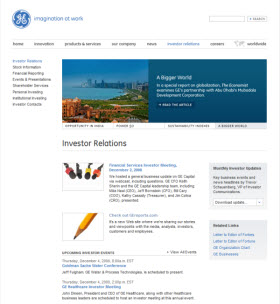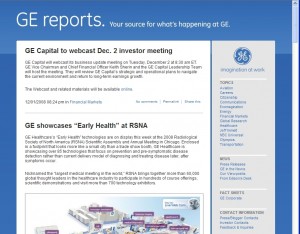Today, I’m going to let you all in on a little secret that many of you may already know, and some of you may find surprising. This is for all of those corporate blog writers and content providers who maintain your company’s website:
Is Your Corporate Blog of Value?
You’re likely shocked, I’m sure, but that is just the plain truth. No one is interested in reading your blog and you may even find that it’s hard to drive traffic to your site. Why am I making this unveiling? You see, when readers scan, peruse, search and Google sites for information, they’re looking for relevant, concise and timely content. They’re looking for information that they can use to apply in their own businesses, practices that have been used over and over, and even case studies that have been shown to provide value. In other words, if your blog doesn’t provide anything of essence or value to your reader, they won’t be back and they will likely click away faster than the time it takes for your web page to load in their browser. Fast.
The Reader Doesn’t Know
What is it that your corporation does or what product do they specialize in? How does your corporate service or product affect the community? How can it make a difference in the life of the reader who’s scanning your post(s) right now? The whole reason that a reader would visit your blog would be to:
1.) find out new information
2.) confirm information they already knew
That’s it. Those are the only two reasons that a reader bothers to read the first few lines in your blog entry. They are skimming for value and want to see if you can enhance their knowledge base in any way. If you do manage to keep their attention, great. If not, well, clicking they will be. It’s unwise to confuse the reader with irrelevant or inapplicable material. While you may think that the television commercial that your corporation made was fantastic (and it may well be), you can enhance the spotlight on this by creating something of value to your reader and share your good news at the same time.
Create Value?
Yes, you can and should create intrinsic value in your blog or website that will make your company a potential household name. For instance, consider maximizing the coverage of that television commercial your company made by offering a free signed copy of the CEO’s book to the first 50 commenters on a blog post. Or, how about establishing a (small) grant as an incentive to a young, budding entrepreneur with an untapped idea. His motivation? Write an essay on how he thinks your company can help make him successful. Post this social activity on your blog or website and let the communities work their magic. Once the Tweets begin and your article appears on Digg or StumbleUpon, you’ll wonder why it has taken you so long to catch on to this idea! It is so advantageous to use the power of media to bring attention to a business.
Jeremy Woolf of the Public Relationships blog wrote this amazing post on how effective (and ineffective) the power of blogging can be if it is not properly strategized. He shed some valuable insight as to why blogs fail. The one that caught my eye almost immediately was because blogs aren’t being read. Bingo.
Per Jeremy:
It appears that in many cases, we’ve simply brought with us the tactics that failed to win the hearts and minds of “old” media to the blogging “new” media. We’re not reading their posts. We’re failing to develop relationships. We’re spamming them with marketing gobbledegook. We’re also assuming they work the same way as journalists.
Good call Jeremy. We’re so busy trying to sell our product, we’re not focusing on relationship building and nurturing. How true is that! So essentially, you get a mix of people, all trying to move their product and not listening to the pitch of the other. They are so consumed with meeting quotas and making sales, they’ve lost the art of good old-fashioned networking. Corporations are especially prone to this type of environment because of the very nature of the way they deal with individuals – usually at arm’s length. Corporate environments have to work even harder to build and gain relationships and often have to go to greater extents to nurture them. Although a challenge it may be, it can be done.
Is your corporate blog connected or in just in existence? What do you do to bring your reader in, share solid, relevant information, provide a foundation to encite learning and community?
Or do you exist just to exist?
__________



